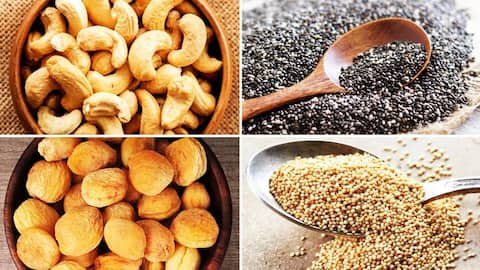These foods have more iron than spinach
What's the story
Oh, the "irony!"
Spinach immediately comes to mind when considering the highest dietary sources of iron. But did you know that this common green vegetable contains less iron than a lot of other offerings?
Don't believe us? Well, today, let's examine these typical foods that, in addition to spinach, you should eat every day to prevent iron deficiency.
Food 1
Apricot
There are many reasons why you should add apricots to your diet, of which one pertains to the level of iron in them.
A 100-gram serving of apricots contains approximately three milligrams of iron, while 100 grams of spinach comprises 2.7 mg of this mineral.
Interestingly, both dried apricots and spinach contain a similar amount of iron.
Food 2
Amaranth
Amaranth is another fantastic food you should savor to keep iron deficiency at bay.
This is because 100 gm of this superfood offers five to eight milligrams of iron, which is way more than what the same quantity of spinach offers.
You can cook a variety of healthy dishes using this millet for your daily consumption.
Food 3
Chia seeds
Even chia seeds outshine spinach in terms of iron content, as these edible seeds contain 7.7 mg of iron per 100 gm serving.
The iron benefits they offer include increasing red blood cell count and aiding in internal cleansing, contributing to overall health.
Consuming two tablespoons of chia seeds daily provides 2.2 milligrams of iron, which accounts for 12% of the recommended daily allowance.
Food 4
Cashews
Next up, cashews take the spotlight for their impressive iron content, surpassing that of spinach.
With 6.7 mg of iron per 100 gm serving, cashews stand out as an excellent source of non-heme iron.
Yet, overindulging in cashews can have adverse effects. Here are some signs that you are eating too many cashews and you should stop.
